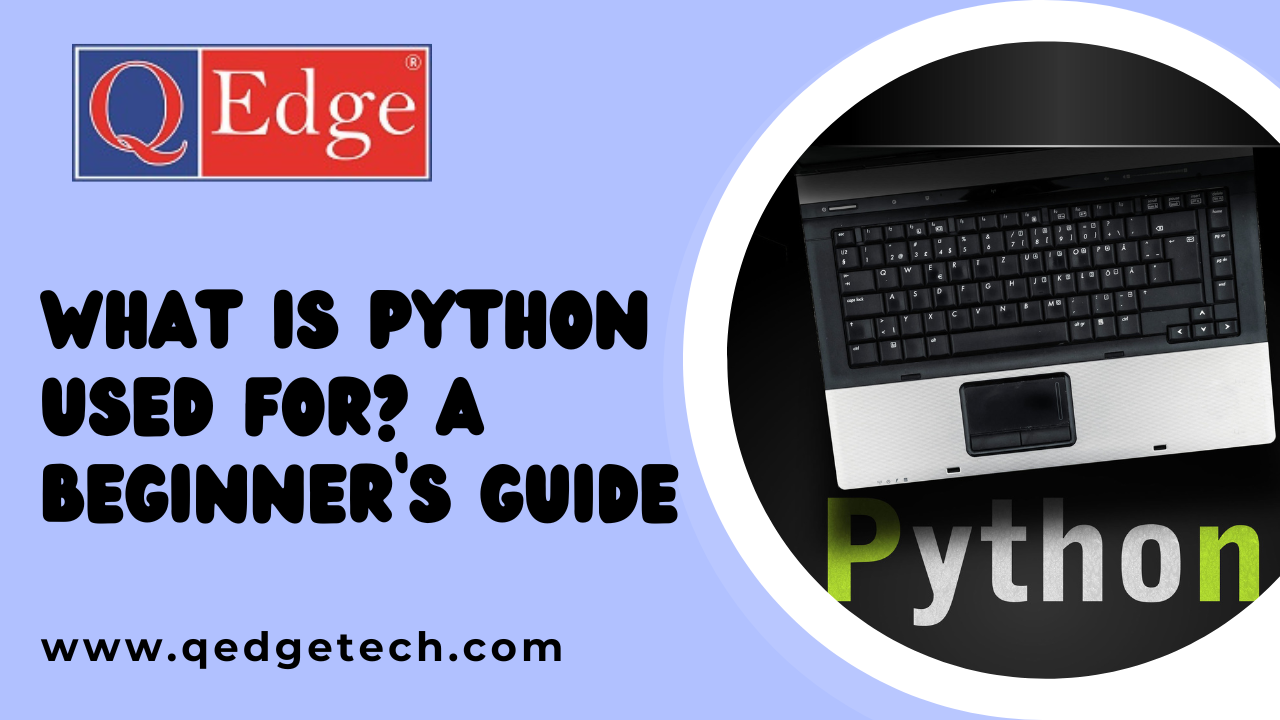What Is Python Used For? A Beginner’s Guide

In recent years, Python has grown to be one of the most widely used programming languages. It has been applied to various fields like as software testing, website development, and machine learning. It is helpful to both developers and non-developers.
One of the most widely used programming languages worldwide, Python, has been used to develop everything from the software that drives self-driving vehicles to Netflix’s recommendation system. Python is a general-purpose language that may be used to produce a wide range of applications, such as data science, online and software development, automation, and making daily tasks easier.
What is Python?
Python is a popular computer programming language used for creating software and websites, task automation, and data analysis. Python is a general-purpose language that may be used to develop a wide range of software; it is not tailored to solve any particular issues. Because of its adaptability and ease of use for beginners, it is currently one of the most popular programming languages. In 2020, Python was cited as the preferred programming language by over one-third of Indian IT professionals. It remains at the top of lists of the nation’s most sought-after programming languages.
What is Python used for?
Python is frequently used for data analysis, data visualisation, task automation, and the development of software and websites. Many non-programmers, including scientists and accountants, have embraced Python due to its ease of learning, and they use it for a range of daily chores, including handling finances.
What can you do with Python? Some things include:
– Data analysis and machine learning
– Web development
– Automation or scripting
– Software testing and prototyping
– Everyday tasks
Data analysis and machine learning
Python has emerged as a key language in data science, enabling experts in the field to perform intricate statistical computations, generate data visualisations, construct machine learning algorithms, work with and analyse data, and accomplish other data-related tasks.
Python is capable of creating a wide range of data visualisations, including 3D plots, pie charts, histograms, and line and bar graphs. TensorFlow and Keras are just two of the many libraries available in Python that help programmers create machine learning and data analysis applications more rapidly and effectively.
Web development
Python is frequently used to create applications and websites that aren’t visible to users on the back end. In web development, Python is used for data routing, data processing, database communication, data transferring to and from servers, and security assurance. Python provides a number of web development frameworks. Two popular ones are Flask and Django.
Back-end engineers, full-stack engineers, Python developers, software engineers, and DevOps engineers are a few web development positions that employ the language.
Automation or scripting
Python automation can help you work more productively if you have a repetitive task. Scripting is the writing of code used to create these automated procedures. Automation can be used in the field of coding to perform simple calculations, check for problems in many files, transform files, and eliminate data duplication.
Even absolute beginners may automate basic computer operations with Python, such renaming files, locating and downloading content from the internet, or scheduling text messages or emails to be sent at predetermined times.
Software testing and prototyping
Python can help with software development chores such as testing, issue tracking, and build control. Software developers can use Python to automate testing of new features or products. Python-based software testing tools such as Green and Requestium are utilised.
Everyday tasks
Python isn’t just for data scientists and programmers. For people in less data-intensive fields like journalism, social media marketing, or small business ownership, learning Python can lead to new opportunities. Python can also make some jobs in the lives of non-programmers easier. Just a few of the things you could use Python to automate are as follows:
When it starts to rain, text yourself to remember yourself to always have an umbrella.
– Make changes to your grocery list.
– Renaming a lot of files at once
– Converting spreadsheets from text files
– Assign family members home chores at random
– Automatically complete online forms
Why is Python so popular?
Python is widely used for various purposes. Here’s a closer look at what makes it user-friendly and adaptable for programmers.
– It is easier to read and comprehend since it has a straightforward grammar that resembles real English. As a result, initiatives can be developed and improved more quickly.
– It is adaptable. Python is useful for a wide range of applications, including machine learning and web development.
Because of its beginner-friendly nature, entry-level coders tend to favour it.
– Since it’s open source, anyone can use and distribute it without restriction—even for profit.
– The collection of modules and libraries for Python, which are collections of code written by other users to enhance the language’s functionality, is enormous and still expanding.
– The Python community is quite extensive and vibrant, adding to the language’s collection of modules and libraries while also serving as a valuable source of information for other programmers. Because of the large support network, coders can usually find a solution quite quickly because someone has probably already dealt with the same issue.
Ready to get started?
Pros in all fields can benefit from knowing Python. Completing a certificate programme like Google’s Google Data Analytics Professional Certificate on Qedgetch can help you develop the technical abilities required to enter the rapidly increasing sector of computers and software, regardless of your experience level with computer coding. You can use this certificate to start working in data analytics at an entry-level position or to expand your career and work towards more senior positions as web developers, software engineers, computer programmers, and more.
